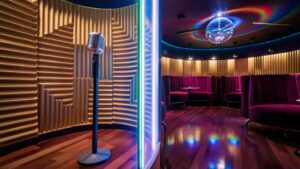
Moving Past Music Issues: Getting Better After a Mistake

Fear on stage and music flubs are common in any music player’s life. The mark of a true pro player is not in being perfect, but in being quick to get back up when things go wrong. From lost words to wrong notes, these glitches can turn into big chances to grow and feel more sure on stage.
Key Ways to Bounce Back for Players
Fast fix skills are key for any artist. Facing a music mess-up, staying cool and using fast fix plans can keep the show moving. The skill to move past errors while staying smooth makes some players stand out from beginners.
Important Show Bounce-back Skills:
- Keep the beat even if you mess up
- Think ahead, not back
- Let body know-how lead you back
- Show boldness through body talk and face
- Have a plan B for usual stage issues
These get-back skills let artists turn set-backs into smooth moves, keeping the crowd into it all through the show. Mastering these moves makes your music show better and builds long-term sureness.
Common Show Errors
Usual Music Show Flubs
Tempo and Beat Problems
Keeping time is tough in live shows. Many times, players speed up or slow down when a part is hard.
This is worse when show fear kicks in, making players rush or lose the beat.
Memory and Skill Challenges
Forgetting parts is a big worry, mainly in tricky tunes with repeated parts. These slip-ups often happen in similar music parts where small changes can confuse the player.
Playing right is hardest under stress, leading to missed notes or off beats. Comparing Karaoke Chain Franchises: Pros, Cons, and Unique Features
Control of Loud and Soft, and Showing Feel
Keeping sound levels right is hard for all skill levels. Issues include being too loud with your group or too soft when solo.
Switching keys and surprise notes often cause trouble, while piano players need to nail the right pedal use for clear sound.
Mind Prep Before Playing
Mind Play Plans
Mind setting and seeing it in your mind are as key as hands-on practice to cut errors during shows.
Good mind play means picturing a winning show while keeping an eye out for hard parts, helping players stay focused and smooth during real shows.
Smart mind prep boosts sureness and lowers mess-up risks due to nerves.
Before You Go On
Having a planned pre-show plan is key for best showtime. This should have:
- Deep breath work
- Good thoughts
- Detailed mind run-through
Taking 10-15 minutes before going on to focus and think it through cuts show errors.
Regular mind time makes your focus better and helps you against outside mess-ups.
Guide Points in Shows
Smart mind marks through your pieces act as key guide spots.
These well set show marks make a built-in bounce-back system, letting you set right fast during live shows.
This brain map plan serves two jobs:
- Cuts mess-ups with better prep
- Quick fix-up when slips happen
Marking your music and steady mind play turn these points into surefire show helps, making sure you do well and cut the chance of errors.
Fix Plans While Playing
Pro Fix Moves for Live Shows

Right Away Answer Plans
Fixing as you go starts with keeping cool when flubs happen.
Put out a sure vibe and keep playing without stopping.
A calm, normal face helps cover any slip-ups while you make quick fixes.
Enhanced Fix Ways
Memory and Finding Your Place
- Safe spots through the piece let you recover safely
- Focus on strong beats to find your way fast when lost
- Keep moving ahead – never try to go back after errors
Playing Fixes
- Main fix: Keep going through the error
- Easier playing: Make hard parts simpler
- Move on: Get to the next solid music part
Together Play Fixes
Keeping together play needs clear signs with your group through good eye talk.
Keep sound levels and steady beat right as these often get worse during fixes.
Pro Show Mind Set
Use fix moves with purpose and surety.
Most in the crowd won’t know small slips if you handle them with pro cool.
Keep the show flowing by not showing signs or saying sorry.
Key Fix Rules
- Keep tempo and beat right
- Use planned fix spots
- Show sureness all through
- Keep group sync 온카스터디 안전업체 보기
- Look forward, not back
Growing Sureness After Shows
Building Sureness After Playing: A Full Fix Guide
Honest Show Look-back
Reviewing your show is key for building lasting sureness. Turn mess-ups into chances to learn by looking at them honestly instead of with strong feelings.
Record your shows and check them after a few days, when you are less tied to them and can see more clearly.
Notes and Self-checking
Create a show journal to keep track of ups and downs. Note down specific parts:
How you played
How you brought the crowd in
Your stage vibe
Show top moments
Many find that what they thought were big mess-ups were hardly seen by the crowd.
Smart Practice Ways
Find out what sets off errors in your shows:
??Tough music parts
Show fear signs
Things around you
Where you feel tight
Fix and Grow Moves
Break down tricky parts into easy bits during practice. Use targeted drills to make weak spots stronger:
Slow beat practice
Focusing on one section
Playing it in your head
Building up to a full show feel
Getting Ready for More Wins
Focus on good vibes while keeping an eye on what could be better.
See each show as a chance to grow not as a final test. This way builds lasting grit and makes your music base strong for future wins.
Learning From Your Flubs
Learning From Your Slips in Music Shows
Seeing Music Errors in a Good Light
Perfect music comes from owning and learning from slips.
Show mistakes are big chances to grow when seen with the right mind and study plan.
Turning errors into growth needs planned checking and smart practice ways.
Checking Show Nos
Clear mistake checks are the base of getting better. Key parts include:
- Finding exact tough spots
- Checking how you played
- Seeing links like play fear
- Recording practice times for pattern spotting
- Writing down repeating problems
Making Smart Practice Moves
Better Skill Plans
- Breaking big troubles into small bits
- Trying different speeds
- Making better finger choices and hand spots
- Building up practice wins
Better Memory Moves
- Deep study of tunes
- Making smart memory marks
- Linking many senses to memory
- Making mind practice stronger
Keeping Notes and Watching Progress
Keeping a detailed practice book turns single errors into planned learning chances. Must-haves include:
- Writing down specific slip-ups
- Using answers and seeing if they work
- Keeping track of how you’re doing
- Making it fit you better
With clear checks and targeted practice, each show slip becomes a key step toward full music skill and true growth.


